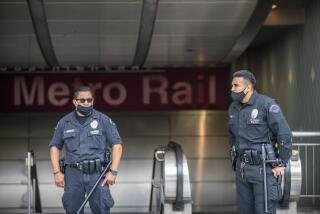Taxi Firms Say Higher Fees Will Boost Fares : Cabbies Upset as City Shifts Regulation of Cabs to MTDB
On Jan. 1 the Metropolitan Transit Development Board will begin to oversee the taxicab business, a regulatory change that has prompted howls of complaint by cab owners who fear higher fees and what they say is a conflict of interest for the transit agency.
After regulating local taxicabs for more than 60 years, San Diego City Council officials announced in June that they were transferring their authority to the MTDB, which runs the San Diego Trolley, San Diego Transit and the California-Arizona Railway, all publicly subsidized transportation systems.
MTDB General Manager Tom Larwin said transit agency officials and the City Council have been planning the regulatory transfer since 1984, when Sandag (San Diego Area Assn. of Governments) evaluated regional transit systems and recommended MTDB regulation of the taxicab industry. According to the study, MTDB regulation would contribute to a more effective regional transportation network that would also encourage commuters to use cabs and public transportation.
Widespread Opposition
Since the changeover was announced in the summer, there has been widespread opposition to MTDB supervision from the cab industry. From Yellow Cab, with 300 cabs the largest company in the city, to the one-car companies, owners are fearful of what the regulatory future and the higher fees planned by the MTDB will bring.
The conflict of interest allegation has emerged as the taxi companies’ rallying cry.
“It’s a big-time conflict of interest . . . . The MTDB runs the trolley and bus company. They’re in competition with us. These are the same people who are going to be regulating us,” said Alfredo Hueso, who with his father and three brothers owns USA Cab, a company with 41 cabs.
But the more immediate concern for cab owners is the prospective fee increase.
The city currently charges cab owners an annual $110 fee per vehicle, an amount that city officials said was half of what it cost to regulate the industry.
Barbara Lupro, who will oversee regulation of the taxi industry for the MTDB, said last week that it may be necessary to charge cab owners as much as $500 per vehicle beginning Jan. 1, so the agency can have “full cost recovery” of its regulatory activities as mandated by state law. Lupro, formerly para-transit administrator for the city, said that MTDB officials have estimated that they need $443,000 to regulate the industry through the end of the fiscal year on June 30, 1989.
In the case of Yellow Cab the new fees mean an additional $150,000 that the company could have to pay beginning in January. Bill Hilton, Yellow Cab’s vice president, said that the company paid the city $33,000 in annual regulatory fees for its fleet in August. Hilton said that city officials told him that he would not get any of that money back and the MTDB will not give him credit for fees already paid.
“The poor owner-driver, the one-car company, is going to have some real financial problems when the MTDB takes over. He probably hasn’t put money aside to take care of this new cost,” said Hilton. “I don’t have money set aside to pay for it. The least they can do is pro-rate the new fee . . . . We’ve heard that some companies are going to have to borrow in order to pay the fee.”
Every cab owner interviewed said that cab rates are going to have to be increased in order for the cab companies to pay the new fee. Before Lupro announced that the fee could amount to as much as $500 per vehicle, cab owners said they expected to pay somewhere between $300 and $400. An increase to $400 would necessitate a minimum 20 cents per mile increase in current fares, some owners said.
Last week seven of the largest cab companies in the city met at the downtown offices of Coast Cab and formed an industry lobby group to battle the MTDB’s plans to assume regulatory powers. On Saturday, the group hired an attorney and met to discuss several possible legal challenges that they hope will delay or block the MTDB from assuming control over the taxicab industry.
Some of the alternatives that the group is considering to stop the MTDB from regulating taxicabs include a possible lawsuit based on the anti-trust laws and a ballot initiative. But cab owners say that they will ask their attorney to first seek a restraining order to delay the transfer until they can go to court in an attempt to block it.
Hilton, who has been in the cab business for more than 40 years in San Diego, said, “We’re a private industry trying to survive strictly on revenues. We’re not subsidized, but now we’re going to be regulated by a heavily subsidized industry. Suppose you have an issue that affects the bus company and the taxi industry and the MTDB has to rule on it. Do you think that they’re going to rule in favor of the transit system that they already run, or a private industry that has been a traditional competitor of the MTDB?”
Andre Jamar, an owner affiliated with Co-Op Cab (an association of several small cab companies), warned other small owners that the MTDB may “legislate us out of existence.”
MTDB General Manager Larwin said that he was surprised by the industry’s opposition to the regulatory move and said there was no conflict of interest.
“Unless I’m missing something, I can’t think of any major conflict of interest. I see it as a coordinated interest. Out job is to get people out of their vehicles and get them on other modes of transportation. I’m quite proud to have the taxicab industry under our wing,” Larwin said.
He also rejected the industry’s argument that the trolley and bus company are direct competitors of the taxi industry.
“There’s no competition, really, between public transit and taxis. Each group serves entirely different customers . . . . MTDB is a transportation agency and we do our best to get people an alternative to the single occupant auto. Our role now is to make the taxicab industry thrive. It’s my objective to get as many people in taxicabs as we can,” Larwin said.
But Larwin acknowledged that “we’ve started off on the wrong foot with the taxi industry” by having to increase the regulatory fees.
“I know there are people out there wondering what’s going to happen. But we’ve done things in an up-front manner and done it in a way to benefit the community. We have not done anything major to change the ordinances, rules and regulations that the city has,”.
Although the MTDB’s regulatory powers extend into several cities in the southwest part of the county, Larwin said that for now the only taxicab industry that the transit agency will regulate is in San Diego.
Hueso said, “ . . . the most devastating thing is that now when we have a problem we’re going to have to appeal to an administrative officer. We no longer have the opportunity to lobby our councilperson. I trust a city council member more than I do an administrative officer. Most city council members are businessmen who can understand our problems and reason with us.”
The new regulatory agency represents another in a continuous stream of changes for the taxi industry in San Diego since it was “deregulated” in 1979. Between 1928, when the city began regulating cabs, and 1979, when the industry was deregulated, officials allowed only 411 cabs in San Diego at any given time.
But when open entry began in 1979, that number more than doubled to 928 in 1983. Currently, there are 893 cabs operating in the city. San Diego’s unique deregulation allowed for a multitude of cab companies. As of Nov. 1, there were 249 taxi companies in San Diego. Most are one-car companies affiliated with a radio dispatching service like Co-Op Cab and Orange Cab.
The city’s unique “staggered” fare schedule also allows for the lowest cab fares of any big California city. The flag drop--the fee paid just for entering a cab--ranges from a minimum of 80 cents to a maximum of $1.41, with $1.17 being the average. Fares range from a minimum of $1 per mile to a maximum of $1.69, with $1.41 per mile being the average.
“This is not a big cab town, and we already have more cabs than we need,” Hueso said. “You take this factor and combine it with the need to raise fares when the MTDB takes over next year and two things are going to happen. A number of cab companies are going to go out of business, which some may say is a good thing. But (riders) are also going to go down because people who ride cabs now will start riding the bus or the trolley, because their fares are going to be cheaper.
“And we’re going to be left exactly where we are now: too many cabs competing for a limited group of riders. So, I don’t want the MTDB to tell me that they’re doing the industry a favor by regulating us.”
More to Read
Sign up for Essential California
The most important California stories and recommendations in your inbox every morning.
You may occasionally receive promotional content from the Los Angeles Times.










